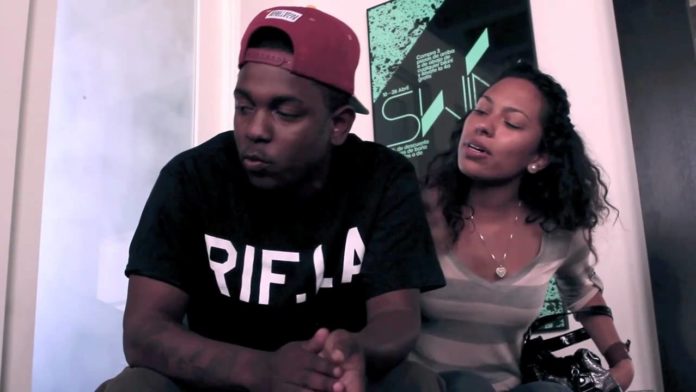Not many artists show progression in their discographies as consistently as Kendrick Lamar. And it’s not just better verses and bigger hits. “Bitch, Don’t Kill My Vibe” is undoubtedly one of K.Dot’s most popular songs, but the conceptual depth of the otherwise meme-worthy single is what sets Kendrick apart from both the best lyricists and the best hitmakers in rap.
Why “Bitch, Don’t Kill My Vibe” and “Cut You Off” Stand Out in Kendrick’s Discography
In terms of maturity, originality, and the development of running themes, it’s hard to argue for another hip-hop artist in the past decade that makes projects with the quality and cohesion that Kendrick Lamar does. Rather than rinse and repeat what has worked for him in the past, a song like “Bitch, Don’t Kill My Vibe” proves Kendrick’s willingness to challenge himself and listeners to express recurring thoughts and feelings in transformative ways.
Like plots in an addictive book series, Kendrick has several consistent themes which he expands upon with every project. One of them is the constant negativity following him from childhood. To Pimp A Butterfly and good kid, m.A.A.d city show that making it out of Compton isn’t enough to get Compton out of you. Survivor’s guilt, strained relationships, and self-hatred are all persistent symptoms of his upbringing.
What am I to do when every neighborhood is an obstacle? / Two niggas making it out had never sounded logical / Three niggas making it out, that’s mission impossible / So I never believed the type of performance that I could do
– “Black Boy Fly,” verse 3
Hopelessness as a result of a very discouraging local environment is present in all of Kendrick Lamar’s projects. Sometimes, he talks about it by telling someone else’s story (e.g. “Sing About Me, I’m Dying of Thirst,” “Tammy’s Song”). Sometimes, he lashes out at his delinquent peers (“Good Kid”) or empathizes with them (“Art of Peer Pressure”). But songs like “Cut You Off” and “Bitch, Don’t Kill My Vibe” are unique because he’s telling the Tammys and the cousin Demetriuses (“Sherane“) to move the fuck around.
As much as he acknowledges their commonalities, Kendrick realizes he cannot be around pessimistic and envious people out of fear of not reaching his true potential.
What Growth Sounds Like
Speak on something with substance that can get us both paid / rather than telling me how these niggas jockin your style or his rims ain’t bigger / pussy nigga, I’ma cut you off
– “Cut You Off,” verse 2
“Cut You Off” was one of the standouts on Kendrick’s Overly Dedicated (2010) mixtape, the last project before his debut album Section.80. At this point he established himself as a very focused artist concerned with healing many social ills by speaking on Compton as experienced by him and his peers. But Kendrick was not above the occasional expression of ego.
While he is usually justified in doing so, the way Kendrick goes about addressing toxic people on “Cut You Off” demonstrates egocentricity more than it does wisdom. He’s frustrated with all the “whoop-de-whoop” and “blasé-blah” people bring. All of the complaints in his verses and the beginning of the hook culminate into the abrasive “Shut the fuck up, ho,” at the end of the hook.
It’s hard to imagine Kendrick speaking like that about his family or peers these days. Vulnerable songwriting and a reserved yet firm vocal tone in “Bitch, Don’t Kill My Vibe” make the track a reflective, mature version of “Cut You Off.”
I can say that I like a challenge and you tell me it’s painless / You don’t know what pain is .. / How can I paint this picture / when the colorblind is hanging with Ya?
– “Bitch, Don’t Kill My Vibe,” verse 1
The bulk of the lyrics in “Bitch, Don’t Kill My Vibe” are respectful challenges as opposed to the scolding Kendrick does in “Cut You Off.” He explains the difficulty in expressing himself because his peers are often ignorant to the complexity of life as well as Kendrick’s thoughts and feelings.
In “Bitch, Don’t Kill My Vibe,” much like most of Good Kid, m.A.A.d City and TPAB, Kendrick removes his ego in a way not many men in their 20s with a background like his can. “Bitch, don’t kill my vibe” is a statement every bit as pointed as “Shut the fuck up, ho,” but minus the air of superiority.
He acknowledges his imperfections throughout “Bitch, Don’t Kill My Vibe,” and chooses to calmly communicate his concerns in the verses rather than angrily push people out of his life. He tries to empathize with them instead of scoff at them, replacing lines like “Before your negative energy curve, bitch I’ma cut you off,” with “I can admit that it [his heart] did look like yours.”
Expressing change and personal growth without betraying your image and alienating parts of your fan base is difficult. What makes the “Cut You Off” to “Bitch, Don’t Kill My Vibe” comparison great is the consistency of the content between the tracks, but with Kendrick showing us the strides someone is capable of in changing their self-perspective and their view on past experiences.
***
Kendrick’s personal evolution shines through in his music. It gives fans a chance to grow with him, or at least better understand what inspires the music. To Pimp A Butterfly is only the most recent example of his ability to broaden the scope of the messages in his music.
We don’t know what’s next from Kendrick. However, if his past work is any indication, Kendrick is not interested in pandering to anyone. He will continue to grow and challenge listeners while unapologetically being him.
UPDATE (6/18/2025): Edited for style and general copy quality
